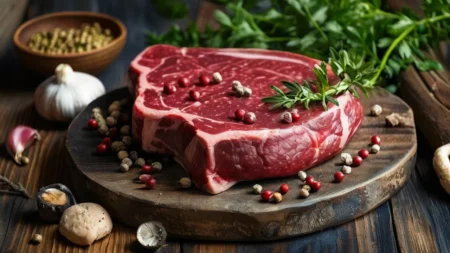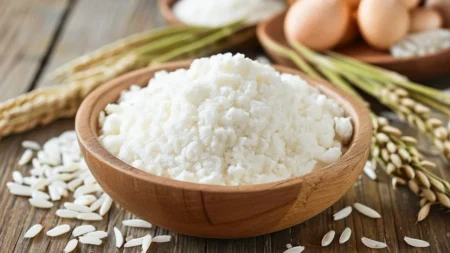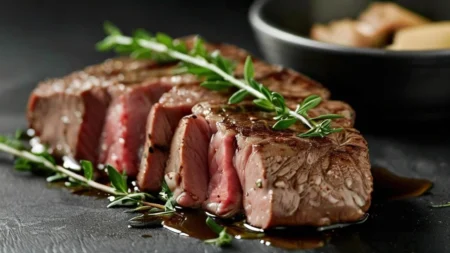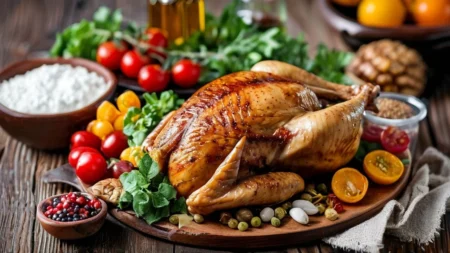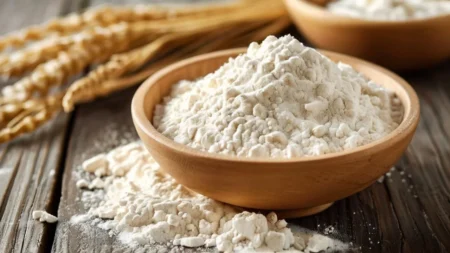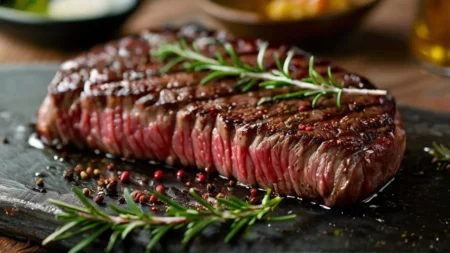Venison: A Lean, Nutritious Game Meat
Key Takeaways
- Venison is a lean meat that is lower in fat and calories compared to beef, making it a healthy choice for protein-rich diets.
- Rich in essential nutrients like iron, zinc, and B vitamins, venison supports muscle growth, energy production, and immune health.
- Venison has a rich, earthy flavor that makes it popular in gourmet dishes and hearty meals.
- Its lower fat content makes it suitable for weight management and heart-healthy diets.
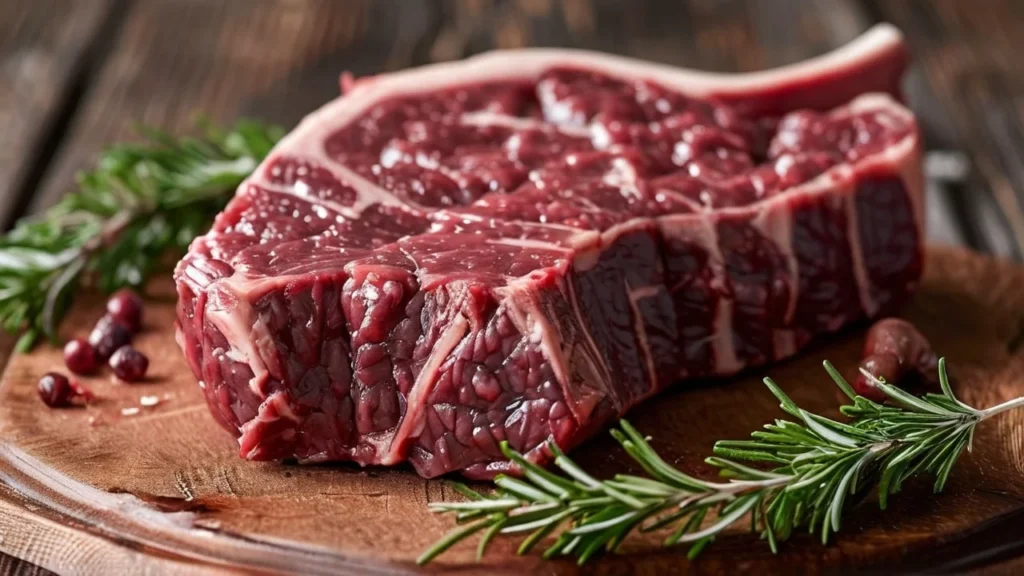
What is Venison?
Venison refers to the meat from deer and is considered a highly nutritious and flavorful alternative to more common meats like beef or lamb. It is known for its tender texture, deep red color, and slightly gamey taste. Historically, venison has been consumed by hunters and rural communities, but in recent years, it has gained popularity among health-conscious eaters and gourmet chefs alike.
The term venison encompasses different species of deer, such as:
- White-tailed deer
- Red deer
- Fallow deer
- Mule deer
Nutritional Value of Venison
Venison is an excellent source of high-quality protein and is notably lower in fat compared to beef or pork. It also contains significant levels of iron, zinc, and several B vitamins, which are crucial for maintaining energy levels and supporting overall health.
Table 1: Nutritional Profile of Venison (per 100g, cooked)
| Nutrient | Amount | % Daily Value (DV) |
|---|---|---|
| Calories | 158 | – |
| Protein | 30 g | 60% |
| Total Fat | 3.3 g | 5% |
| Saturated Fat | 1.2 g | 6% |
| Cholesterol | 85 mg | 28% |
| Iron | 4.5 mg | 25% |
| Zinc | 4.0 mg | 27% |
| Vitamin B12 | 2.4 mcg | 100% |
| Niacin (B3) | 8.1 mg | 40% |
Health Benefits of Venison
Rich in Lean Protein
Venison is a fantastic source of lean protein, which is essential for muscle repair and growth. With over 30 grams of protein per 100 grams of cooked meat, venison is ideal for athletes, bodybuilders, and individuals on high-protein diets like Paleo or Keto.
- Scientific Insight: According to the Journal of Clinical Nutrition, consuming lean meats like venison helps maintain muscle mass while supporting fat loss due to its lower fat content compared to beef or pork.
Iron-Rich for Energy and Blood Health
Venison is notably high in iron, making it an excellent option for individuals looking to boost their iron intake. Iron is essential for producing hemoglobin, the protein in red blood cells that carries oxygen throughout the body. Consuming venison regularly can help prevent iron-deficiency anemia, which is particularly beneficial for women, athletes, and those following plant-based diets who may be prone to low iron levels.
Supports Immune Health with Zinc
Zinc is crucial for immune function, wound healing, and DNA synthesis. Venison provides a substantial amount of zinc, which helps the body fight off infections and maintain overall health.
Types of Venison Cuts and Their Uses
Like beef, venison comes in various cuts, each with unique characteristics that determine how they should be prepared and cooked. Given venison’s lean nature, certain cuts may require slow cooking or marinating to enhance tenderness.
List: Popular Venison Cuts
- Venison Tenderloin: The most tender cut, perfect for quick cooking methods like grilling or pan-searing.
- Venison Loin: Lean and tender, suitable for roasting or grilling.
- Venison Shoulder: A tougher cut that benefits from slow cooking methods such as braising.
- Venison Steaks: Sliced from the hindquarters, best cooked to medium-rare for optimal tenderness.
- Ground Venison: Often used for burgers, meatloaf, or sausages, offering a lean alternative to ground beef.
Venison vs. Beef: Nutritional and Culinary Comparison
Venison and beef are often compared due to their similar uses in cooking, but venison stands out as the leaner and more nutrient-dense option.
- Venison: Lower in fat, calories, and cholesterol compared to beef, venison is an ideal meat for heart-healthy and weight-conscious diets.
- Beef: Higher in saturated fat and calories, beef is richer in taste but may not be as healthy for those managing cholesterol or fat intake.
Table 2: Venison vs. Beef Nutritional Comparison (per 100g, cooked)
| Meat Type | Calories | Protein | Fat | Saturated Fat | Iron |
|---|---|---|---|---|---|
| Venison | 158 | 30 g | 3.3 g | 1.2 g | 4.5 mg |
| Beef | 250 | 26 g | 17 g | 7 g | 2.6 mg |
Culinary Techniques for Cooking Venison
Venison’s lower fat content requires careful cooking to avoid overcooking and drying out the meat. It’s best cooked quickly over high heat or slow-cooked to retain moisture.
List: Common Cooking Methods for Venison
- Grilling: Perfect for tender cuts like venison steaks or tenderloin, grilling adds a smoky flavor without overcooking.
- Pan-Seared: Quick and ideal for tenderloin or loin cuts, pan-searing seals in juices and enhances flavor.
- Braising: For tougher cuts like shoulder or shank, slow braising in liquid ensures the meat becomes tender and flavorful.
- Slow Cooking: Venison roasts and stews benefit from slow cooking, which helps break down connective tissues.
- Ground Venison: Can be used in a variety of dishes, such as venison chili, burgers, or meatballs.
Venison and Dietary Considerations
Weight Management and Heart Health
Venison is much leaner than traditional red meats like beef or lamb, making it an excellent choice for individuals looking to reduce fat and calories in their diet. Its lower fat content also makes venison a heart-healthy option, reducing the risk of high cholesterol and heart disease.
Ideal for Paleo and Keto Diets
With its high protein content and low fat, venison fits perfectly into Paleo and Keto diets. Its gamey flavor complements a variety of low-carb vegetables, making it a versatile ingredient in high-protein, low-carb meal plans.
Nutrient-Dense for Athletes
Venison’s rich supply of iron, protein, and B vitamins makes it particularly beneficial for athletes, who need these nutrients to maintain energy levels, muscle function, and recovery after intense physical activity.
Ethical Sourcing and Sustainability
Venison is often viewed as a more ethical and sustainable meat choice compared to commercially raised livestock. Wild venison is typically harvested through regulated hunting, which helps control deer populations and prevent overgrazing of natural habitats.
Ethical and Sustainable Benefits of Venison:
- Wild Sourcing: Venison is often wild-harvested, meaning the animals live freely in their natural habitat without exposure to industrial farming practices.
- Sustainable Population Control: Controlled hunting helps manage deer populations, preventing overpopulation and protecting ecosystems from damage due to overgrazing.
- Minimal Environmental Impact: Since venison is typically sourced from wild game or sustainable farms, its environmental footprint is smaller compared to the intensive resources required for raising cattle.
Conclusion
Venison is a lean, nutrient-rich meat that offers an excellent alternative to traditional red meats. Its high protein content, low fat levels, and rich supply of vitamins and minerals make it an ideal choice for health-conscious individuals, athletes, and those on specialized diets like Paleo and Keto. Venison’s earthy flavor and versatility in the kitchen allow for a range of cooking methods, from quick grilling to slow-cooked stews. With its ethical sourcing and sustainable benefits, venison is a nutritious and environmentally friendly option for those seeking a healthy, delicious meat choice.
FAQ
1. Is venison healthier than beef?
Yes, venison is leaner and lower in fat and calories compared to beef, making it a healthier option for weight management and heart health.
2. What is the best way to cook venison?
The best way to cook venison depends on the cut. Tender cuts like venison steaks or tenderloin are best grilled or pan-seared, while tougher cuts like shoulder benefit from slow cooking or braising.
3. Does venison taste different from beef?
Venison has a richer, earthier flavor compared to beef, with a slightly gamey taste. It’s less fatty, which gives it a cleaner, more pronounced flavor.
4. Is venison a good source of iron?
Yes, venison is an excellent source of iron, containing nearly twice the amount of iron found in beef. This makes it a great choice for those looking to boost their iron intake.
5. Is venison sustainable?
Venison is considered a more sustainable meat option, especially when sourced from wild game through regulated hunting, which helps manage deer populations and supports ecosystem health.





